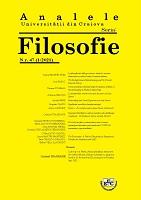EGALITATEA MORALĂ ȘI OBIECȚIA VARIAȚIEI
MORAL EQUALITY AND THE OBJECTION FROM VARIATION
Author(s): Bogdan OlaruSubject(s): Ethics / Practical Philosophy
Published by: Editura Universitaria Craiova
Keywords: moral equality; moral status; dignity; moral personality; variations;
Summary/Abstract: There is no doubt great appeal in the idea that all persons are equal: they all bear the same value as human persons and they all deserve concern for and respect of their legitimate interest to pursue a fulfilled life. However, any concept of moral equality that anchors moral status in empirically observable, natural capacities, like the ability to identify reasons and act upon them, ends up facing the same problem: human abilities come in varying degrees, thus people’s moral value must vary as well. The objection from variation says that people are not equal because their moral status varies in accordance with their different capacities. After a short introduction to the idea of moral equality, I will turn to John Rawls’s concept of equal status and its resilience to this objection. His solution amounts to an approach that treats differences in moral personality above a certain threshold as natural assets, whose distribution, like that of any other natural ability, is subjected to the difference principle. Yet, naturalist conceptions of moral equality face another, more challenging version of the objection from variation. Richard Arneson and Jeremy Waldron raised the question whether rational agency is enough to offer a correct characterization of the idea of person. This worry shifts the debate toward a more pluralistic view about human capacities that ground a person’s basic status. Human interactions are complex and rich enough to cast doubt on conceptions that put their whole weight behind a single, generic, though fundamental human capacity. I will argue that alternative, more sensitive ways are necessary to make a convincing plea for human equality. Starting with Rawls’s observation that a conception of justice articulates only one aspect of morality, I shall argue that a robust theory of moral equality goes far beyond securing equal basic rights and liberties. There is not only one moral interest or the moral interest par excellence, from which all requirements of morality derive. There is not only one human capacity that might serve to ground moral equality.
Journal: ANALELE UNIVERSITĂȚII DIN CRAIOVA. SERIA FILOSOFIE
- Issue Year: 1/2021
- Issue No: 47
- Page Range: 125-146
- Page Count: 22
- Language: Romanian

